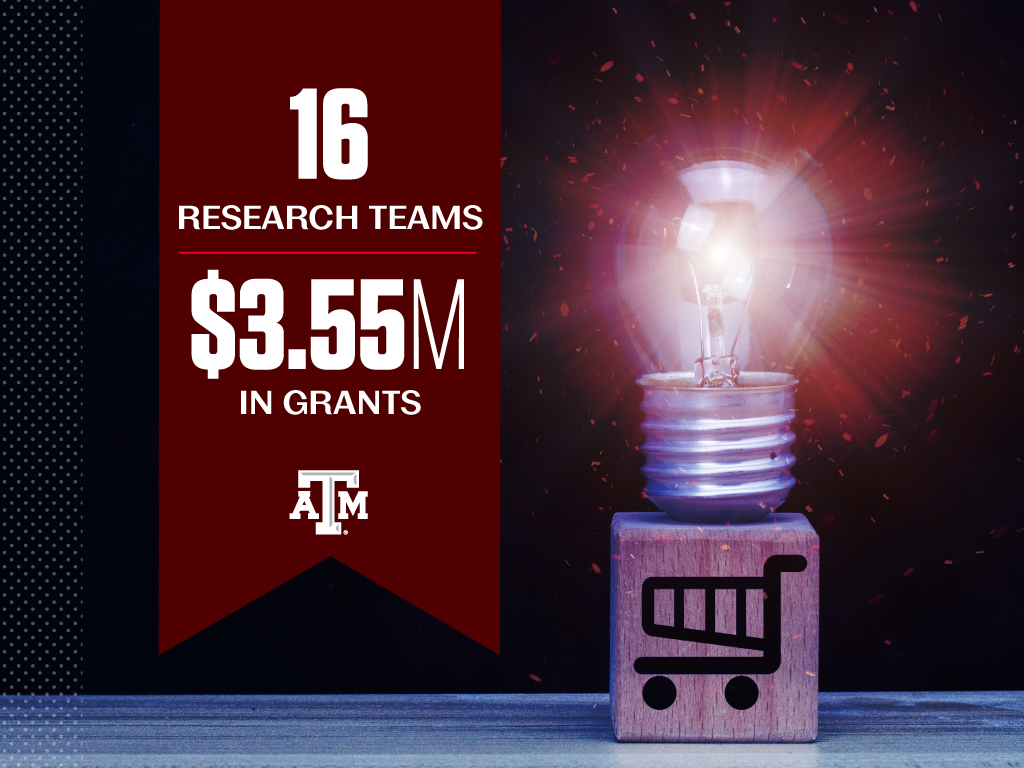Sixteen Research Teams At Texas A&M Receive Innovation Awards

GooMmnutt/stock.adobe.com
Sixteen teams of Texas A&M University researchers will share awards totaling more than $3.55 million from the university’s Advancing Discovery to Market (ADM) program, the Division of Research announced today.
Launched in February, ADM supports researchers within the Texas A&M research enterprise as they develop innovations into products or demonstrate their market potential.
“I congratulate these outstanding research teams for bringing significant innovations to the cusp of the marketplace,” said Gen. (Ret.) Mark A. Welsh III, interim president. “Their work is foundational to the research mission of our land-grant university: To make discoveries, refine them into products and introduce them into our society for the common good.”
The $5 million program is open to researchers, faculty, staff and students of Texas A&M University and its partners among The Texas A&M University System’s state agencies: the Texas A&M Engineering Experiment Station, the Texas A&M Transportation Institute and Texas A&M AgriLife Research.
“Advancing any discovery from workbench to marketplace is a significant challenge for any university researcher,” said Dr. Jack G. Baldauf, vice president for research. “These 16 projects offer great promise for finding commercial success through a patent, a license or a start-up company. We look forward to watching their journey toward that end.”
The program received funding from Texas A&M’s Office of the President and the Texas A&M University System’s Office of the Chancellor. Dr. Henry Fadamiro, associate vice president for research, served as the program lead and administrator. In addition to Baldauf, the program’s management team included Greg Hartman, chief operating officer and senior vice president, Office of the President; Dr. Joe Elabd, vice chancellor for research, the Texas A&M University System; Pete O’Neil, chief innovation officer, Texas A&M Innovation; and Blake Petty, executive director, McFerrin Center for Entrepreneurship, Mays Business School. An external review committee of investors, entrepreneurs and business leaders evaluated the proposals.
ADM offers two award levels based on a discovery’s maturity.
Type 1 awards present $99,000 or less to research projects that have found an innovation but have yet to identify a specific application. Principal investigators for each of these 11 funded projects are:
- Swapnil Samant, Texas A&M Transportation Institute (TTI), “Hazmat identification in transportation corridors using advanced AI techniques,” $99,530, with co-principal investigators Dr. David Bierling, Leonard Ruback and Bradley A. Trefz, all from TTI.
- Dr. Zhilei Chen, School of Medicine, “Novel therapeutics for treating S. aureus infection,” $99,000, with co-principal investigator Dr. Magnus Höök, Institute of Biosciences and Technology.
- Dr. Mahua Choudhury, School of Pharmacy, “Saving mother and newborn with miRNA-epigenetic method,” $99,000.
- Dr. Shoshana Eitan, College of Arts and Sciences, “Novel oral pharmaceutical antidepressants,” $99,000, with co-principal investigators Dr. Robert S. Chapkin, Texas A&M AgriLife Research, and Dr. Stephen Safe, School of Veterinary Medicine and Biomedical Sciences.
- Dr. Shaodong Guo, College of Agriculture and Life Sciences, “Discovery of novel chemical inhibitors for heme-oxygenase-1 in treatment of Type 2 diabetes mellitus and NASH,” $99,000, with co-principal investigator Dr. Wenshe Liu, College of Arts and Sciences.
- Dr. Jayshree Mishra, School of Pharmacy, “Developing a new class of Jac3-directed chemo therapeutics for the treatment of triple negative breast cancer-brain metastasis,” $99,000, with co-principal investigator Dr. Narendra Kumar, School of Pharmacy.
- Dr. Ali Mostafavidarani, College of Engineering, “AI-empowered digital twin for climate resilience analytics,” $99,000.
- Dr. Patrick Shamberger, College of Engineering, “Robust, low-cost thermal energy storage media for HVAC and heat pumps,” $99,000, with co-principal investigator Dr. Svetlana Sukhishvili, College of Engineering.
- Dr. Nancy Downing, School of Nursing, “Text-SAFE: Innovative technology to provide follow-up care after sexual assault,” $98,975, with co-principal investigator Dr. Farzan Sasangohar, College of Engineering.
- Dr. Sanjay Antony-Babu, College of Agriculture and Life Sciences, “Developing biofertilizer inoculum towards sustainable corn production,” $90,084, with co-principal investigator Dr. Julio Bernal, College of Agriculture and Life Sciences.
- André Thomas, School of Performance, Visualization and Fine Arts, “Digital replica platform,” $81,389.
Type 2 awards of $100,000 to $500,000 provide funding for refining an innovation and advancing it to the marketplace. Principal investigators for each of the five funded projects are:
- Dr. Arum Han, College of Engineering, “Rapid development of next-generation antibiotic and antifungals,” $500,000, with co-principal investigator Dr. Arul Jayaraman, College of Engineering.
- Dr. Arthur Sefiani, School of Medicine, “IND-enabling studies on 5c(i) for traumatic spinal cord injury,” $499,637, with co-principal investigators Dr. Kevin Burgess, College of Arts and Sciences; Dr. Cedric G. Geoffroy, School of Medicine; and Dr. James Sacchettini, College of Agriculture and Life Sciences.
- Dr. Dinakar Sagapuram, College of Engineering, “MetPeel: Disruptive technology for steel strip production,” $497,591, with co-principal investigator Dr. Prabhakar Pagilla, College of Engineering.
- Dr. Ziyaur Rahman, School of Pharmacy, “N-nitroso impurity free varenicline stable formulations of varenicline hydrochloride for smoking cessation,” $496,117, with co-principal investigator Dr. Mansoor Khan, School of Pharmacy.
- Dr. Aaron Morton, School of Education and Human Development, “Effectiveness and toxicology of dystrophix in a large animal model of muscle dystrophy,” $495,972, with co-principal investigators Dr. Mariana Gomes, School of Education and Human Development, and Dr. Peter P. Nghiem, School of Veterinary Medicine and Biomedical Sciences.

